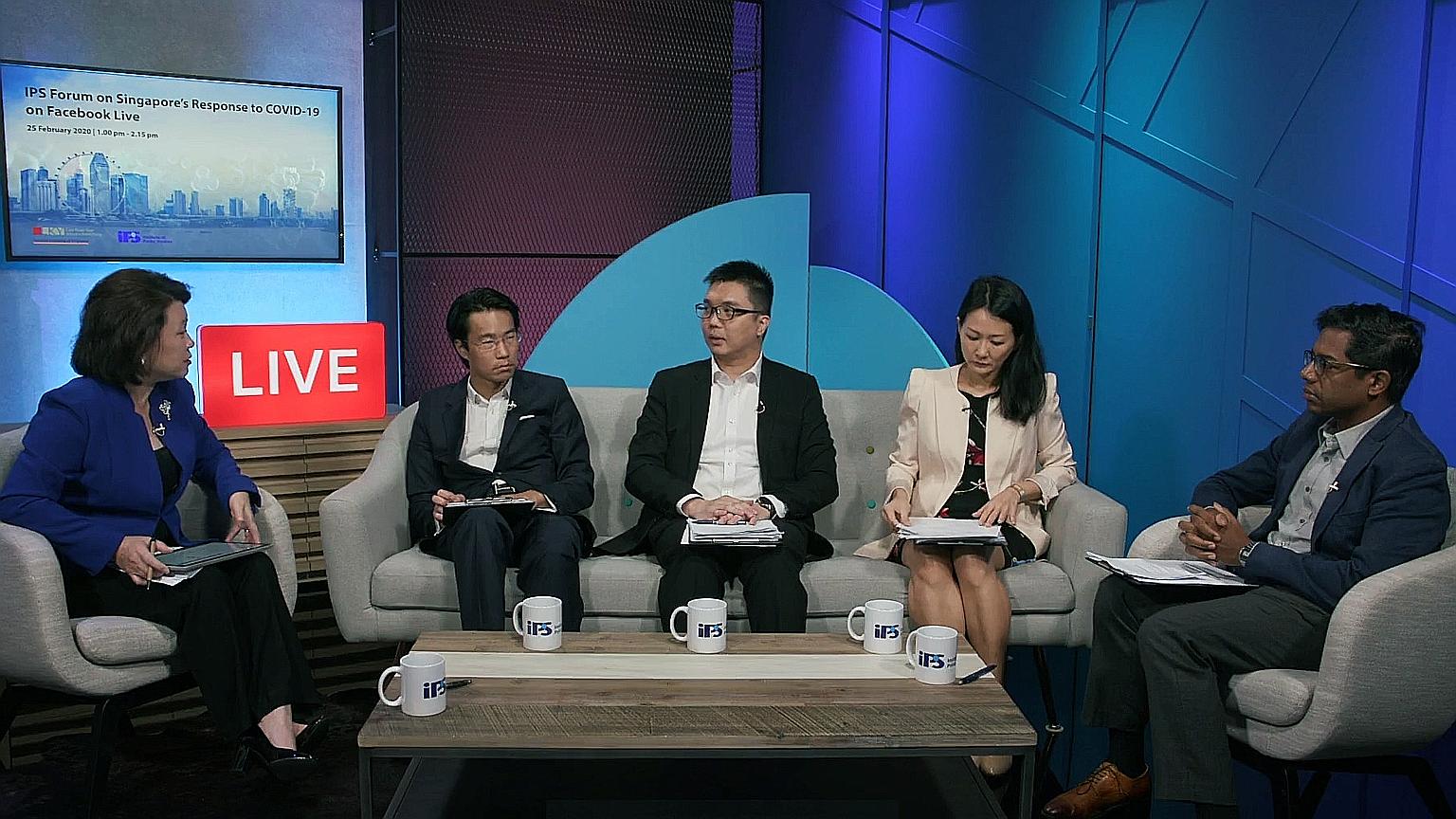Crucial for community to bounce back after coronavirus crisis: IPS forum panellist
Sign up now: Get ST's newsletters delivered to your inbox

Speaking at the forum held at Facebook's Singapore office yesterday were (from left) moderator Gillian Koh, deputy director for research at IPS, and panellists, Associate Professor Vernon Lee, director of the Health Ministry's communicable diseases division; United Overseas Bank economist Barnabas Gan; IPS senior research fellow Carol Soon and Dr Shashi Jayakumar, head of the Centre of Excellence for National Security at the S. Rajaratnam School of International Studies.
PHOTO: INSTITUTE OF POLICY STUDIES/FACEBOOK
Follow topic:
Unlike a terrorist attack, the coronavirus outbreak is a "slow burn" issue that can chip away at a community's social resilience, said security expert Shashi Jayakumar.
As the outbreak could last a long time, it is crucial that the community is able to bounce back to normalcy, he added.
How it recovers needs to be closely studied by governments and academics, in the same way terror incidents were analysed after the Sept 11 attacks in 2001, Dr Jayakumar said yesterday at an Institute of Policy Studies (IPS) forum on Singapore's response to the coronavirus outbreak.
"We may have to accept that this thing creeps out into society, despite our best efforts," he noted, adding that the best-laid plans can "go out the window" in these circumstances.
"What about something that is gnawing away at your preparedness, your resilience?... It's not something that can be done and dusted like a terrorist incident," he said.
Dr Jayakumar, head of the Centre of Excellence for National Security at the S. Rajaratnam School of International Studies, also said he believes Singapore has struck the right balance between working towards containment and preparing its citizens for a wider outbreak.
As part of preventive measures against the infectious disease, many Singapore events have been shelved, cancelled or modified to avoid the gathering of large numbers of people.
At the forum, the panellists sat in a studio at Facebook's Singapore office, and the discussion was live-streamed to a virtual audience on the social media platform.
Dr Jayakumar, noting that containment of the virus was the focus of other governments, said: "In other words, when it does seep into the community... it becomes almost like falling off a cliff."
He added: "This is starting to happen, and it starts to seed some of the intolerance and xenophobia that we're starting to see."
In the past month, reports of increased hostility towards Chinese immigrants and tourists have emerged in countries such as the US, Italy and South Korea.
Similar sentiments have been voiced in Singapore, Dr Jayakumar said, in response to a question from moderator Gillian Koh, deputy director for research at IPS.
"At some points, criticism was justified. But at some points, it really went over the top... Some of the China-bashing is really quite crude; it's quite xenophobic and it's rather unthinking."
During the 90-minute dialogue, the panellists also brought up issues such as fake news and the economic impact of the coronavirus.
They included Associate Professor Vernon Lee, director of the Health Ministry's communicable diseases division, IPS senior research fellow Carol Soon and United Overseas Bank economist Barnabas Gan.
Dr Soon said one indicator of social resilience is people's ability to take care of others. This, she added, is the significance of the ground-up initiatives which have emerged in Singapore in recent weeks to support the needy.
These include efforts to collect and distribute hand sanitisers for people living in rental blocks, or translate health advisories into vernacular languages.
"On top of what the Government is doing, you have citizens doing similar things," she said. "That is mutual reinforcement, which can be very powerful."
But the virus epidemic has also resulted in the emergence of an "info-demic" where falsehoods are spreading online, she said.
These include rumours of a coronavirus death in Singapore, or that salt water can help to prevent one from getting the virus.
Such falsehoods tend to happen when there is an information gap, especially in situations where knowledge is evolving and much remains unknown, she said.
"People will attempt to find whatever information they can find to fill in the gaps," she added.

